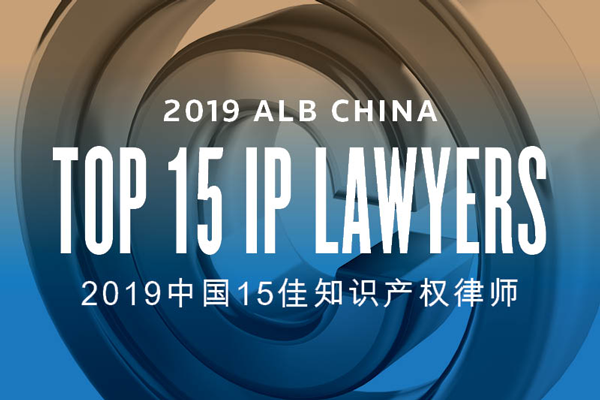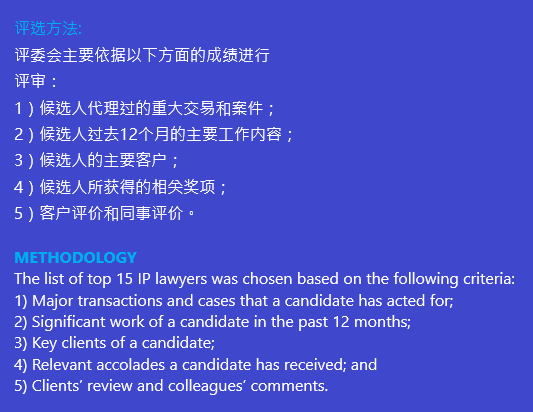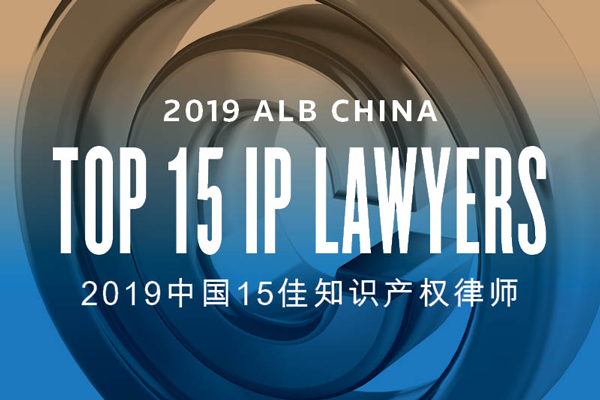
《亚洲法律杂志》(ALB)持续关注知识产权法律领域和优秀的知识产权律师。今年,ALB从律所推荐、律师成就、执业特色和客户评价等方面进行考察,完成了知识产权律师调研,评选出了2019年中国15佳知识产权律师。
2019年的政策动态
在过去12个月,中国知识产权领域立法活跃,各层级立法文件发布频率较高,也有相当数量的已发布文件在2019年开始实施。今年的上榜律师之一、来自万慧达知识产权的雷用剑律师向ALB介绍了涉及知识产权领域几大板块的重要调整:(1)商标方面:2019年4月,第十三届全国人大常委会决定对《商标法》作出修改,在打击恶意注册和保障权利人赔偿方面又向前迈出一步;北京高院发布《关于商标授权确权行政案件的审理指南》;国知局颁布《规范商标申请注册行为若干规定》以及《关于商标电子申请的规定》。(2)专利方面:在技术合同方面,因为2019年3月通过的《外商投资法》规定技术合作合同当事人平等协商确定合同内容,行政机关不得干预,《技术进出口管理条例》因此做了相应修改,删除了行政干预技术合同内容的条款。在专利获权确权方面,国知局2019年9月发布公告对《专利审查指南》进行了修订。2019年11月,为落实《中华人民共和国促进科技成果转化法》,《北京市促进科技成果转化条例》通过,强化了科研人员成果转化自主权,细化了科技成果转化奖励和报酬等收益分配。(3)版权方面:国家市场监督管理总局在2019年7月发布了三部反垄断部门规章,包括《禁止垄断协议暂行规定》、《禁止滥用市场支配地位行为暂行规定》以及《 制止滥用行政权力排除、限制竞争行为暂行规定》。(4)反不正当竞争法方面:《反不正当竞争法》在商业秘密保护上有较大突破,不仅规定了惩罚性赔偿,还专门增加一条规定了举证责任的倒置,更有利于商业秘密的权利人。
这些政策上的变化给知识产权律师的工作带来了深远影响。雷用剑律师表示:知识产权律师需要熟稔这些重大政策变化的背景、对实操的具体影响,并能够对应客户的具体情况,将这些变化外化为在法律允许范围内最大化委托人权益的切实可行的法律建议。这就要求知识产权律师在具体操作层面,从案件实体和程序上投入更多的时间进行研究探索和实践。世泽律师事务所的姬军律师也指出:作为知识产权律师,在知识产权政策层出不穷的背景下,一方面是要及时地学习和跟进具体的政策变动,了解最新的趋势和变动;更为重要的是,通过长期的执业对国内外政策的了解,对国内政策可能变化的趋势能够作出一定程度的预测。如同做案子一样,最重要的是收集充分的信息、制定最优的策略;在服务客户时,掌握政策变更也是最重要的,掌握政策可以为我们执业把握住大方向。
2019年的立法动态充分反映了中国正在加快建设知识产权保护体系的步伐。天驰君泰律师事务所的上榜律师郭春飞表示:目前中国政府已将知识产权保护的重要性提高到前所未有的高度,做出了实行严格保护知识产权制度的重大决策部署,从行政、司法等多个方面着手,加大知识产权保护力度。例如:从立法角度,2019年通过了新修订的商标法,而对第三次著作权法修改和第四次专利法的修改也在加快推进,新法积极引入侵权惩罚性赔偿制度,真正把违法成本显著提上去。从司法制度完善方面,今年在最高人民法院设立了专业化的知识产权法庭,这将更好地帮助中国实施知识产权相关法律法规,以应对目前在知识产权司法领域所面临的各种挑战。知识产权法官的素质也在大幅度提升,每年从最高人民法院到各地方法院,都会选出十大最有影响的知识产权案件,集中展示了法院知识产权司法保护工作的创新成就,具有学术研究价值和审判实践借鉴意义。环球律师事务所的马德刚律师也认为国内知识产权保护体系建设的成就有目共睹,知识产权快保护、严保护的氛围已经形成。以保护知识产权鼓励、促进创新、创造的氛围正在逐渐形成。专利、商标申请量快速增长,知识产权已经成为当下的热门话题和热门行业。在此背景下,关于客户应该如何保护自己的知识产权这一话题,姬军律师提出了四点建议:1. 重视知识产权形成过程中各项证据的留存及取证,合理利用时间戳、公证等证据保全形式;2. 重视保密制度等规章制度的建立和实施,建立完善、可操作的保密制度;3. 重视知识产权的权属形成意识,及时进行专利申请、商标注册、著作权登记等;4. 建立知识产权档案,由专门的部门或人员对公司各种形式的知识产权进行统一管理,保存权利证明文件、著作权原始载体等,避免过期未续费;对不利于自身知识产权的登记、注册行为尽早提起异议、无效等对抗性程序。
与时俱进的专业服务
在回答如何不断为客户提供高品质专业服务这一问题时,受访律师们不约而同地提到了要不断学习、与时俱进。雷用剑律师表示:首先要重视专业基本功、重视持续学习。社会在不断发展,法律在不断变化,尤其在知识产权领域,新问题、新案件层出不穷。律师对于业务领域内的所有相关法律问题都要进行持续的学习,这样才能为客户提供最佳的解决方案。不可松懈,不能吃老本,要适度且勇敢地走出舒适区。第二,重视团队力量,善用团队而非仅靠个人帮助客户解决问题。在越是专业的领域,个人的局限性体现得越明显。如何打造和合理组织团队的力量和智慧因地制宜地为客户解决难题,是知识产权律师应当具有的能力。第三,了解客户、了解客户的需求。律师行业作为服务行业,很多情况下了解客户比了解案件和法律问题更为重要。客户的需求的多样性超乎想象,律师不能用千篇一律的公式、模板和无感情的文字“公事公办”。了解客户所处的境况,了解个案所处的大环境,涉外律师也要做到更深入了解客户国家的语言和文化。同时还要参加高质量的领域内社交活动。走出去才能引进来,在有限的时间内有选择性地参加高质量的社交活动,对律师的眼界、思路和社交能力帮助明显。来自金诚同达律师事务所的汪涌律师也强调了不断学习的重要性,他说道:“作为知识产权律师 ,对于知识的更新和环境的适应方面需要更高的要求。我们律师事务所、知识产权部、专业团队都有定期的培训和学习的规划,以此来适应不断更新的法律知识和变化社会环境。时刻保持学习的姿态,更新法律知识体系,掌握司法裁判的动向,为客户做出准确预判;对新型知识产权的问题始终保持高度的敏感性,做精做专,只有这样才能满足知识产权法律服务中出现的新事物、接受最苛刻的客户所认可,提供具有竞争力的法律服务。”在郭春飞律师眼中,这种不断学习、与时俱进的精神就是“ 匠人”精神的体现,她认为律师要踏实做工,秉持不断学习的态度,随着数字技术和信息技术的不断发展,互联网悄然改变着生活的方方面面,也对知识产权保护在多方面产生了巨大影响,因此律师需要与时俱进,熟悉相关法律规定,了解行业的发展。
除此以外,姬军律师还提出要从客户的角度出发去解决问题,站在客户的角度想问题。“我们的客户很多都是外国公司,他们对于律师的依赖相比国内公司要更多,所以我们更要帮助客户解决问题,而不是仅仅给出法律意见。同样地,因为客户更依赖律师,如何建立与客户之间的信任更为重要;例如案件启动前,都会把所有可能的结果都作出分析并告诉客户;这样案件进展中的任何发展都在预期内,客户对我们的信任就自然会累积。”他说到。
展望未来
关于知识产权行业的未来发展走向,雷用剑律师预测知识产权领域的国际合作和交流将进一步加强,中国知识产权律师也将进一步融合到国际合作和竞争中去。汪涌律师认为,在未来10年,人工智能(AI)将在评估知识产权的价值、借助算法评估专利审查的情况、提高可预测性和削减知识产权所有者的成本等方面改善知识产权实践。算法也可以经过“培训”对知识产权组合分析和管理,使其更具成本效益且更精准化。然而同时,随着系统变得更加复杂和富有创造性,人工智能的使用将不可避免地产生新的问题,法院和立法者必须解决机器创造的知识产权发明权问题。此外,技术还将影响着知识产权管理和律师与客户之间的互动:对前者来说,智能软件将成为一种标准工具。虽然它可能无法取代律师带来的专业知识,但机器学习正在迅速改进,挑战律师价值的技术最终可能取代一部分律师。虽然许多知识产权律师确信他们的职位不会受到人工智能的威胁,但机器学习最终可能取代他们。对后者而言,由于采用了大量新的通信方法和设备,律师和客户不再需要长途跋涉进行面谈。事实上,他们甚至可能永远不会见面,同时仍然可以从新的互动关系中受益。技术进步使客户能够选择律师,与他们互动,并远程完成必要的法律工作。10年后,通信技术的发展将使面谈会议渐渐消失。
NAME 姓名 | FIRM 律所名称 |
*The list is arranged alphabetically based on the initials of lawyers’ names. | |
Spring Chang 苍雨春 | Chang Tsi & Partners 铸成律师事务所 |
Chen Wenping 陈文平 | King & Wood Mallesons 金杜律师事务所 |
Guo Chunfei (Cherry) 郭春飞 | Tiantai Law Firm 天驰君泰律师事务所 |
Ji Jun 姬军 | Broad & Bright 世泽律师事务所 |
Lei Yongjian 雷用剑 | Wanhuida Intellectual Property 万慧达知识产权 |
Ma Degang 马德刚 | Global Law Office 环球律师事务所 |
Ma Yufeng 马宇峰 | Orrick, Herrington & Sutcliffe 奥睿律师事务所 |
Scott J. Palmer | Perkins Coie LLP 博钦律师事务所 |
Wang Weidong (Wade) 王卫东 | Dentons 大成律师事务所 |
Wang Yong 汪涌 | Jincheng Tongda & Neal Law Firm 金诚同达律师事务所 |
Wang Yonghong 王永红 | Zhong Lun Law Firm 中伦律师事务所 |
Wu Li 吴立 | Anjie Law Firm 安杰律师事务所 |
Xi Minjie 奚敏洁 | Jingtian & Gongcheng 竞天公诚律师事务所 |
Xu Chumeng (Jessica) 徐初萌 | JunHe LLP 君合律师事务所 |
Christine Yiu 姚捷 | Bird & Bird 鸿鹄律师事务所 |

2019 ALB China Top 15 IP Lawyers
Just like in previous years, Asian Legal Business (ALB) celebrates the achievements in China’s intellectual property (IP) legal sector and its best IP lawyers. We researched on IP lawyers and selected a total of 15 top practitioners this year based on law firm recommendation, lawyer achievements, practice skills and client reviews.
2019 has been an active year in terms of the development of IP policies. These outstanding lawyers, by keeping up with the policy development pace, continuously provide clients with high-quality and professional services and strong protection for their IP rights. ALB interviews some of the winners of 2019 ALB China Top 15 IP lawyers, listens to their observations on the changes in IP policies, their plans for maintaining and continuously improving service quality, and their outlook for the future.
NEW POLICIES IN 2019
Lei Yongjian, a partner at Wanhuida Intellectual Property, tells ALB that there have been important adjustments in several major sectors of the IP field: (1) Trademark. In April 2019, the Standing Committee of the 13th National People’s Congress decided to revise the Trademark Law, taking one step forward in the attempts to combat acts of malicious registration of trade-marks and to protect the rights holder’s right to compensation; the Beijing High People’s Court promulgated the Guidelines for the Adjudication of Administrative Cases on Granting and Affirming Trademark-related Rights; and the State Intellectual Property Office (SIPO) promulgated the Certain Provisions on Regulating Application for Trademark Registration and the Provisions on Electronic Trademark Applications; (2) Patent. Regarding the contents of technical contracts, since the Foreign Investment Law (which is promulgated in March 2019) stipulates that the conditions for technical cooperation shall be negotiated and determined by all parties to the investment on an equal basis, and administrative organs shall not interfere in it, the Regulations on the Administration of Technology Import and Export has been revised accordingly by removing stipulations on administrative organs’ interference with the contents of technical contracts. Regarding the granting and affirming patent-related rights, the State Intellectual Property Office issued an announcement in September 2019, under which the Patent Examination Guidelines is revised. Intending to thoroughly implement the Law of the People’s Republic of China on Promoting the Transformation of Scientific and Technological Achievements, the Regulations of Beijing Municipality on Promoting the Transformation of Scientific and Technological Achievements is adopted in November 2019, which enhances the rights of technical personnel to make their own decisions on the transformation of scientific and technological achievements, and specifies detailed rules for the distribution of rewards and remuneration in connection with the transformation of achievements. (3) Copyright. The State Administration for Market Regulation released three sets of anti-monopoly departmental rules in July 2019, namely, the Interim Provisions on Prohibiting the Conclusion of Monopoly Agreement, the Interim Provisions on Prohibiting the Abuse of Dominant Market Position, and the Interim Provisions on Preventing Acts of Abusing Administrative Power to Exclude or Restrict Competition; and (4) Anti-unfair competition. The Anti-unfair Competition Law makes a big break-through in terms of the protection of trade secrets. In addition to the concept of punitive damages, the new Law introduces the inversion of the burden of proof, which is more favourable to the rights holders of trade secrets.
These policy changes have had a profound impact on the work of IP lawyers. Lei noted that IP lawyers need to have good knowledge of the background of these major policy changes, and the specific impact on practice, and should be able to, based on these changes, provide client-specific feasible legal advice to maximize the benefits of clients within the scope permitted by law.
Ji Jun, founding partner of Broad & Bright, says that IP lawyers should learn about the latest trends and changes of IP policies and keep abreast of the changes related to specific scenarios; and more importantly, IP lawyers should develop the capability of foreseeing the trend of possible changes in domestic policies based on their practicing experiences and understanding of domestic and international policies. It is the same as the handling of cases – the most important work is gathering sufficient information to formulate the optimal strategy. It is also the most important to keep abreast of policies changes when serving clients. Grasping policies can help provide clients with services of good value.
China is accelerating the construction of the intellectual property protection system, which is fully manifested in the legislative developments in 2019.
Guo Chunfei, a partner at Tiantai Law Firm, says that attaching unprecedented importance to the intellectual property protection, the government has made an important plan for implementing a strict intellectual property protection system and strengthening the intellectual property protection by administrative and judicial means. For example, from the legislation perspective, the newly revised Trademark Law has been adopted in 2019, while the regulators are pushing forward with the third revision of the Copyright Law and the fourth revision of the Patent Law at an expedited pace. The new laws actively introduce a system of punitive damages to increase penalties for IP infringements. In terms of the improvement of the judicial system, the intellectual property tribunal of the Supreme People’s Court was established this year to better implement laws and regulations related to intellectual property protection and support judiciaries in dealing with various challenges in connection with intellectual property disputes. Furthermore, the Supreme People’s Court and local courts select top ten influential intellectual property cases each year to showcase the innovation achievements of the courts in the judicial protection of intellectual property, which are of academic research value and reference significance for trial practice.
Ma Degang, a partner at Global Law Firm, agrees that China has done a lot in recent years to intensify the construction of the systems for intellectual property protection, thus an atmosphere of quick and strict protection of intellectual property has been formed, while an atmosphere of encouraging, promoting innovation and creation with the protection of intellectual property rights is gradually taking shape. With the rapid growth of patent and trademark applications, intellectual property has become a hot topic, and intellectual property protection services are in great demand.
Regarding how clients should protect their intellectual property rights, Ji Jun from Broad & Bright offers four suggestions: (1) Gathering and keeping evidence in the course of creating intellectual property, and making reasonable use of evidence preservation means such as timestamps and notarization; (2) Establishing and implementing rules and regulations on confidentiality system, and setting up a complete and operable confidentiality system; (3) Enhancing the awareness of intellectual property rights, and carrying out patent application, trademark registration, and copyright registration on time; and (4) Establishing intellectual property files, and appointing a specialized department or personnel to uniformly manage the company’s intellectual property by such means as appropriately keeping the rights certification documents, copyright original carriers. And when finding possible infringement on your intellectual property rights, it is important to initiate procedures to protect your rights as early as possible, such as raising objections to or applying to invalidate registrations in question.
KEEPING PACE WITH THE TIMES
When asked about how to continuously provide high-quality professional services to clients, the lawyers inter-viewed all referred to keeping learning and keeping pace with the times.
Lei from Wanhuida says that professional skills and keeping learning are fundamental. With the rapid development of the society and the legal sector, in particular, in the field of intellectual property, lawyers are faced with new issues and new scenarios all the time; this requires us to keep learning and exploring to find the best solutions for our clients. It means that we need to step out of our comfort zone, bravely and moderately. Working as a team is another important factor. Good teamwork is a key to provide clients with tailored services, especially when helping clients to solve highly technical and complex issues. Furthermore, understanding your clients and their needs is crucial. In many cases, it is more important to understand our clients than to learn about the cases and related legal issues. The needs of clients can vary greatly; therefore we need to provide services that are tailored to each specific situation. For example, we need to learn about the current situation of the client and the general environment where the case takes place; for lawyers handling foreign-related cases, they should also have the right language skills and have a good understanding of the culture of the client’s country. And participating in high-end social events in the intellectual property field is also recommended, which could help lawyers to expand their horizons and improve their social skills.
Wang Yong, a partner at Jincheng Tongda & Neal Law Firm, also emphasizes the importance of the continuation of learning. “It has higher requirements for intellectual property lawyers in terms of the updating of knowledge and the capability of adapting to environment. In this regard, at our firm, we have regular training and learning plans for lawyers to update their knowledge and help them to adapt to a changing environment. By continuously learning and updating our legal knowledge, and grasping the trends of judicial adjudication, we aim to make good judgments for our clients. We’ll always maintain a high degree of sensitivity to new types of intellectual property issues, and stay up-to-date with new things emerging in the intellectual property legal services, to provide clients with competitive legal services and gain trust and recognition of clients.”
Guo from Tiantai believes the craftsman spirit is manifested in continuous learning and advancing with the times. She says that lawyers need the spirit of craftsman, learning with great concentration and being down-to-earth at work. With the continuous development of digital and information technology, the Internet is changing all aspects of our lives, and has a huge impact on intellectual property protection. Therefore, lawyers need to keep pace with the times, be familiar with relevant laws and regulations, and keep abreast of the development of related industries.
Ji Jun echoes the ideas and observations have just been shared. He adds that lawyers need to see problems and find solutions from the perspective of clients. “Many of our clients are foreign companies, who, different from domestic companies, rely more on their lawyers. We help them fix problems, not just giving legal advice. Because of their dependence on us, it is more important to build trust. For instance, before a case is initiated, we would calculate all possible outcomes through analysis and report them to clients, so they would have general ideas about what are going to happen. This is a process of building trust,” Ji said.
LOOK TO THE FUTURE
Regarding the future development of intellectual property industry, Lei fore-sees that international collaborations and exchanges in the field of intellectual property will be further strengthened, and Chinese intellectual property lawyers will be more and more involved in international cooperation and competition. The application of artificial intelligence in the field of intellectual property legal services will continue to deepen. In terms of the trademark sector in China, in the future, trademark applications will gradually change from quantity to quality. With the implementation of measures to combat malicious registration of trademarks and acts of “trademark hoarding”, the surge in trademark applications is expected to be effectively controlled. At the same time, as foreign companies compete for the Chinese market and Chinese companies go global, it can be expected that foreign companies’ intellectual property disputes in China (including disputes between foreign companies in China) will increase gradually, and Chinese companies will also be involved in more and more intellectual property cases on the global scale.
Wang from Jincheng Tongda & Neal believes that in the next 10 years, artificial intelligence (AI) will help improve the practice of intellectual property in terms of evaluating the value of intellectual property, using algorithms to assess patent examination, improving predictability and reducing the cost of intellectual property owners. The algorithm can also be “trained” to analyse and manage the intellectual property portfolio, making it more cost-effective and more accurate. However, as the systems become more complex and creative, the use of AI will inevitably bring about new problems. Courts and legislators must address the problem of the invention right of machine created intellectual property. The intellectual property management and the interaction between lawyers and their clients will also be affected by technology. AI software will become a standard tool for the management of intellectual property. Although it might not be able to replace the expertise that lawyers bring, with the rapid advancement of machine learning, and technologies which bring challenges that lawyers have to confront might eventually replace some of the legal professionals. Although many intellectual property lawyers are convinced that their positions are not threatened by artificial intelligence, let’s face this: technology is changing legal culture and what it means to be a lawyer. But at the same time, thanks to the wide application of new communication approaches and equipment, lawyers and their clients no longer have to travel long distances to have meetings in person, they now could interact with each other easily and more efficiently. Advances in law technology make it possible for lawyers to complete the necessary legal work remotely. The development of communication technology will make the in-person inter-views gradually disappear in ten years, Wang added.
In this context, going global has become the career development direction of many outstanding intellectual property lawyers.
Lei says that he will further enhance his professional skills through systematic learning and practice in the next few years. He also plans to expand in overseas markets while providing better services to his existing clients; and he would actively participate in international exchanges of various academic researches and best practices related to the protection of intellectual property, and make the voice of China’s intellectual property industry heard.
Guo would use her good language skills to explore the foreign-related intellectual property legal service market in the future, helping Chinese companies to go out, and meanwhile helping foreign clients to enter the Chinese market.
“During the past two decades, as lawyers handling foreign-related cases, we mainly help foreign companies to protect their rights and interests in China, help them to do business. In the future, we will do more to support Chinese enterprises to go global, protecting the intellectual property of Chinese companies, and helping them better develop their business globally. It is definitely the trend,” Ji says.
To contact the editorial team, please email ALBEditor@thomsonreuters.com.




